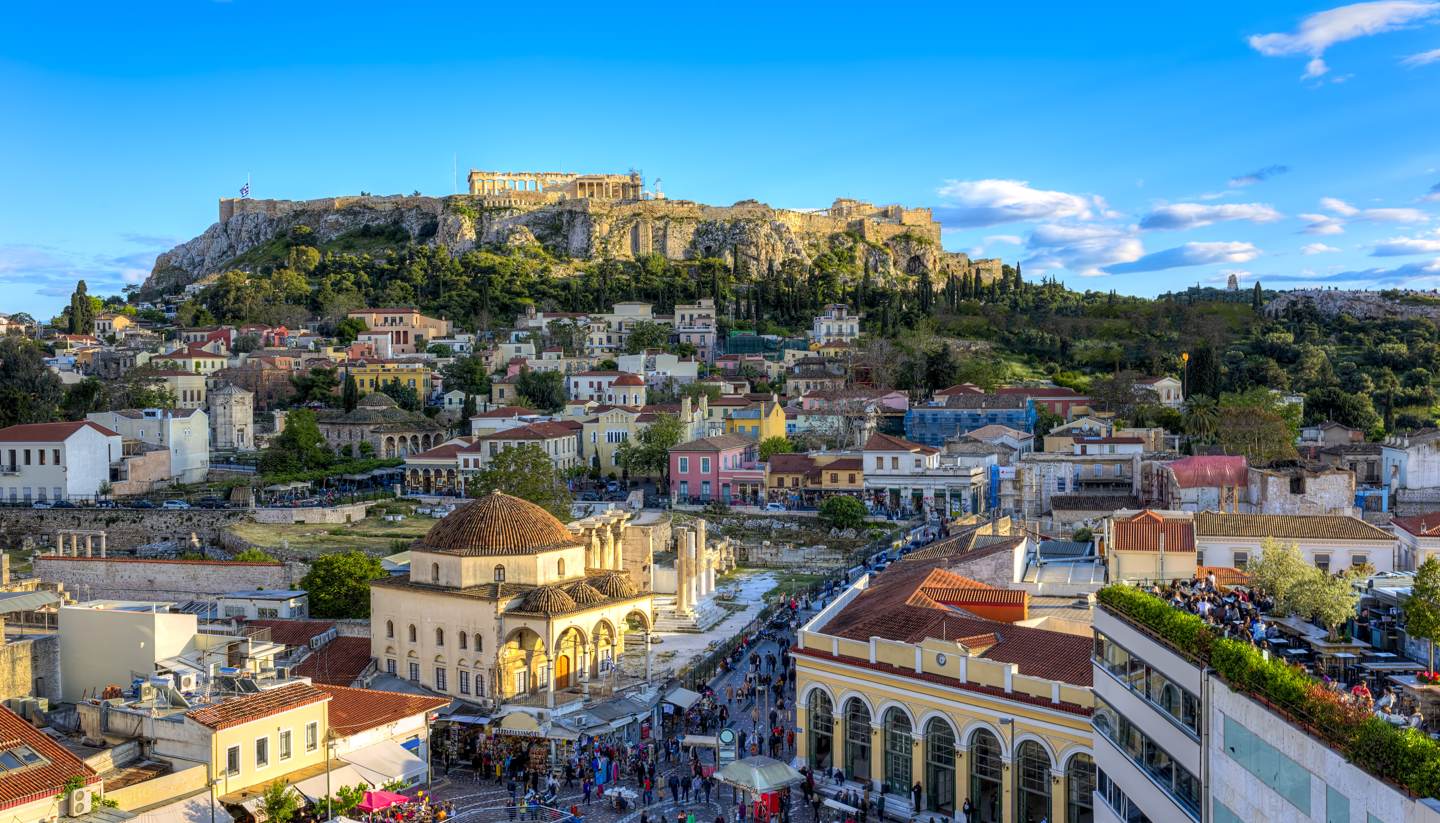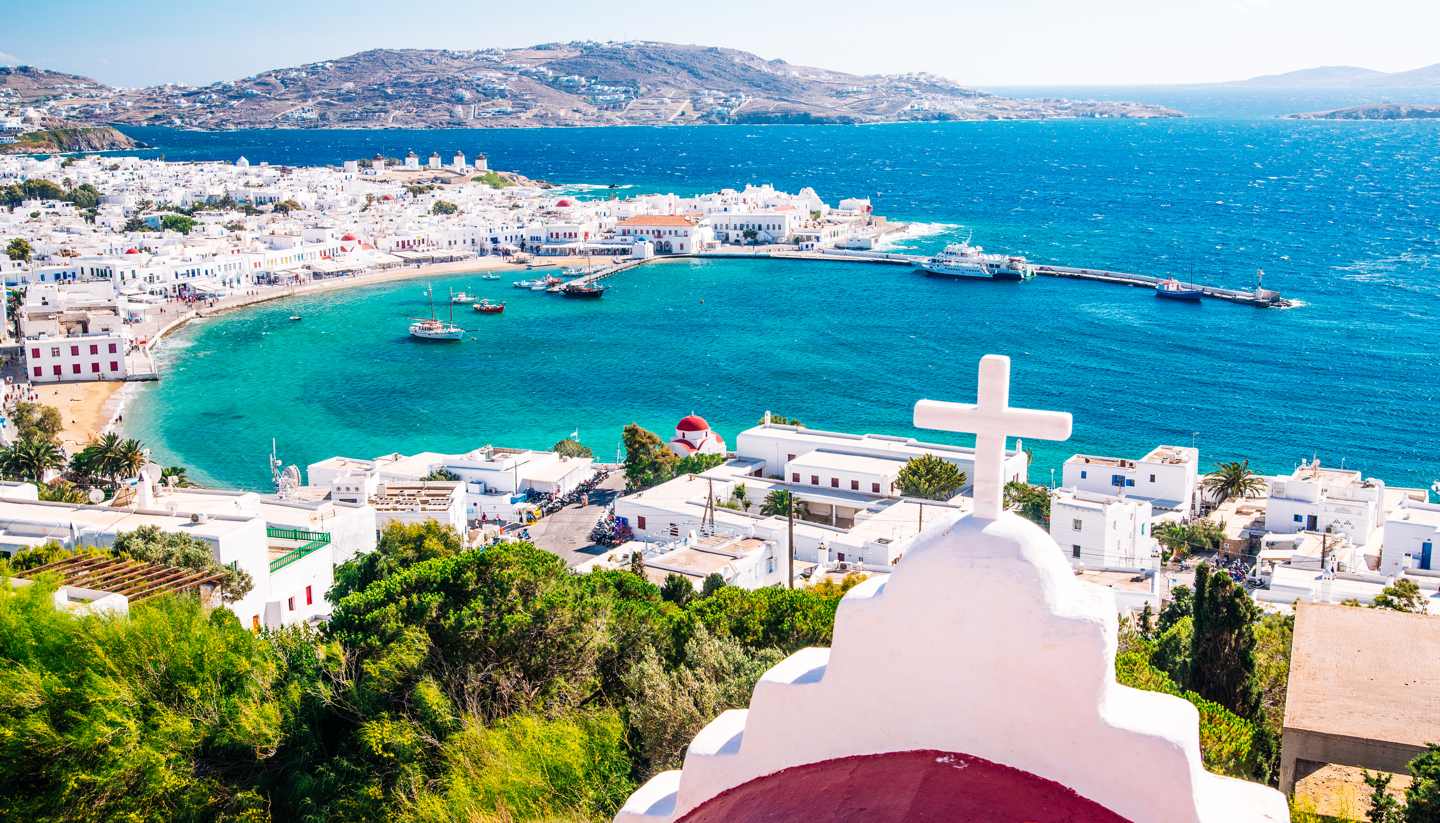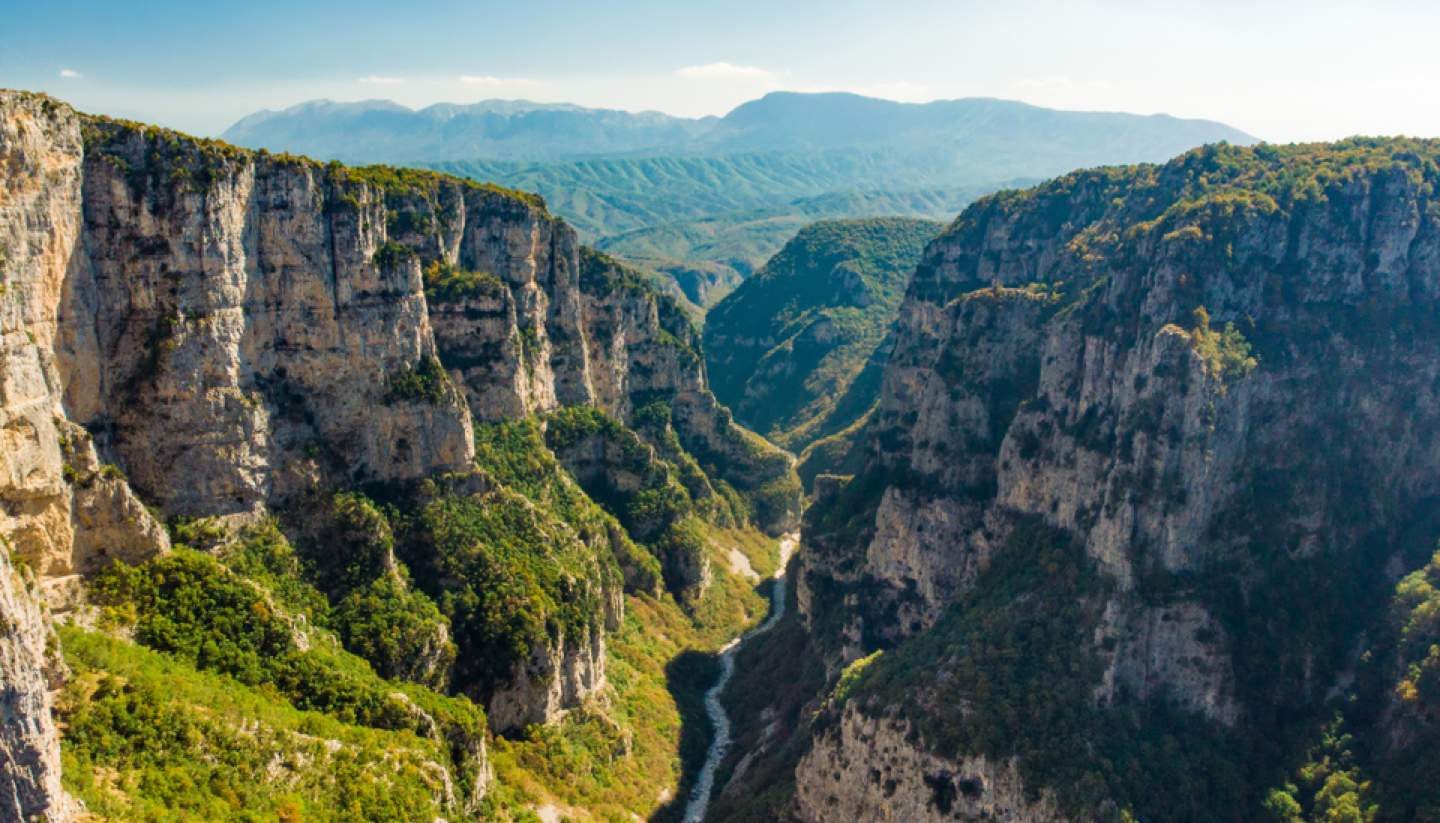Greece travel guide
About Greece
A flavourful melting pot of sparkling nightspots, fresh seafood, sizzling Mediterranean passion and mythical legend, Greece is a fascinating and enchanting destination.
The country has long held appeal for travellers who flock to its shores to lounge on beaches, explore ancient relics and take advantage of the legendary Grecian hospitality.
Yet despite its popularity, there is still an undiscovered feel to parts of Greece with Mount Olympus, the Peloponnese coast and some of the more remote islands slipping, for now at least, under the radar of mass tourism.
The first port of call for most visitors is Athens, the country's stunning capital, which combines a modern centre with the stark ancient beauty of the Parthenon and a position overlooking a cerulean stretch of the Saronic Gulf.
Like the rest of the country, Athens was built on a classical civilisation that produced some of the world's greatest thinkers, philosophers and poets. The ancient Greeks also brought the world democracy, which locals cheerfully remind visitors about, and a pantheon of deities, who are celebrated through statues and local folklore.
Everywhere has its own legend; from the tiny island of Ithaca, home to the wanderer Odysseus, to the rugged stretch of the Peloponnese, the onetime playground of divine beings.
Though the glory days of the Ancient Greeks have passed, the country remains one of Europe's leading holiday destinations, thanks largely to its gorgeous collection of islands, which are scattered like confetti across the Mediterranean Sea.
Greece boasts 6,000 islands and islets in all, all of which only 277 are inhabited. Among them is Rhodes, which was home to the ancient Minoan culture and, legend has it, the terrifying Minotaur. Today it is better known for its stunning beaches, charming seaside towns and lively nightlife.
The islands of Corfu, Crete and Santorini are also established hangouts for sun-seekers and merrymakers, while Kos has begun to attract deities of a very modern kind – the world’s rich and famous. Ultimately, though, in democratic Greece, everyone is welcome.
Key facts
131,957 sq km (50,949 sq miles).
10,473,455 (UN estimate 2019).
81.7 per sq km.
Athens.
Republic.
President Constantine An. Tassoulas since 2025.
Kyriakos Mitsotakis since 2023.
Travel Advice
Wildfires in Greece
There is a high risk of wildfires during the summer season from April to October. For advice, visit the wildfires section on the Safety and security page.
Before you travel
No travel can be guaranteed safe. Read all the advice in this guide. You may also find it helpful to:
- see general advice for women travellers
- read our guide on disability and travel abroad
- see general advice for LGBT+ travellers
- read about safety for solo and independent travel
- see advice on volunteering and adventure travel abroad
Travel insurance
If you choose to travel, research your destinations and get appropriate travel insurance. Insurance should cover your itinerary, planned activities and expenses in an emergency.
About FCDO travel advice
The Foreign, Commonwealth & Development Office (FCDO) provides advice about risks of travel to help you make informed decisions. Find out more about FCDO travel advice.
Get travel advice updates
Sign up to get email notifications when this advice is updated.
Follow FCDO:
This information is for people travelling on a full ‘British citizen’ passport from the UK. It is based on the UK government’s understanding of Greece’s current rules for the most common types of travel.
The authorities in Greece set and enforce entry rules. If you’re not sure how these requirements apply to you, contact the Greek Embassy in the UK.
Passport validity requirements
Greece follows Schengen area rules. Your passport must:
- have a ‘date of issue’ less than 10 years before the date you arrive – if you renewed your passport before 1 October 2018, it may have a date of issue that is more than 10 years ago
- have an ‘expiry date’ at least 3 months after the day you plan to leave the Schengen area (the expiry date does not need to be within 10 years of the date of issue)
Check with your travel provider that your passport and other travel documents meet requirements. Renew your passport if you need to.
You will be denied entry if you do not have a valid travel document or try to use a passport that has been reported lost or stolen.
Visa requirements
You can travel without a visa to the Schengen area, which includes Greece, for up to 90 days in any 180-day period without a visa. This applies if you travel:
- as a tourist
- to visit family or friends
- to attend business meetings, cultural or sports events
- for short-term studies or training
The requirements for working in Greece are different. If you are a touring creative, see details about the Uniform (Schengen) visa.
If you’re travelling to other Schengen countries as well, make sure your whole visit is within the 90-day visa-free limit. Visits to Schengen countries within the previous 180 days before you travel count towards your 90 days. If you overstay the 90-day visa-free limit, you may be banned from entering Schengen countries for up to 3 years.
Make sure you get your passport stamped on entry and exit.
If you’re a visitor, border guards will look at your entry and exit stamps to check you have not overstayed the 90-day visa-free limit for the Schengen area.
If your passport is missing a stamp, show evidence of when and where you entered or left the Schengen area (for example, boarding passes or tickets) and ask the border guards to add the date and location in your passport.
You may also need to:
- show a return or onward ticket
- prove that you have enough money for your stay
Staying longer than 90 days in a 180-day period
For a longer stay, you must apply to the Greek authorities for a national visa.
If you’re in Greece with a residence permit or long-stay visa, this does not count towards your 90-day visa-free limit.
Read about passport stamping if you live in Greece.
New Schengen entry requirements
The EU’s Entry/Exit System (EES) is expected to start in October 2025. It is not currently in operation. The European Union will inform about the specific start date of the EES before its launch.
Read more information on the EU Entry/Exit System.
Vaccine requirements
For details about medical entry requirements and recommended vaccines, see TravelHealthPro’s Greece guide.
Customs rules
There are strict rules about goods that can be brought into and taken out of Greece. You must declare anything that may be prohibited or subject to tax or duty.
Taking food into Greece
You cannot take meat, milk or products containing them into EU countries. There are some exceptions such as powdered baby milk, baby food and special foods or pet feed required for medical reasons.
Taking money into Greece
Declare cash or travellers cheques at your point of entry into Greece if you are carrying a value of 10,000 euros or more. You will be asked to complete the relevant declaration forms provided to you by the Customs Authorities. You should request a certified copy of the declaration to keep with you. If you do not, your money could be seized when you leave. You can read further detail on the website of the Greek Independent Authority for Public Revenue.
Terrorism
There is a high threat of terrorist attack globally affecting UK interests and British nationals, including from groups and individuals who view the UK and British nationals as targets. Stay aware of your surroundings at all times.
UK Counter Terrorism Policing has information and advice on staying safe abroad and what to do in the event of a terrorist attack. Find out how to reduce your risk from terrorism while abroad.
Terrorism in Greece
Terrorists are likely to try to carry out attacks in Greece.
Attacks could be indiscriminate, including in places visited by foreign nationals.
There have been several attacks involving explosives and automatic weapons against Greek institutions, shopping malls, banks, media offices, diplomatic premises and the police.
Protests and demonstrations
Political protests
Greek authorities have increased security at some prominent locations, including tourist sites, due to events in Israel and the Occupied Palestinian Territories.
There is currently a heightened risk of such protests, particularly in central Athens.
Stay aware of your surroundings, stay away from protests and follow the advice of local authorities.
Strikes and demonstrations
There are regular strikes, sometimes called at short notice, that can cause disruption to buses, trains, ferries and air travel, as well as road networks and borders.
Demonstrations often take place around major squares in central Athens, in particular Syntagma Square. Political demonstrations may take place on certain dates:
- 1 May (Labour Day)
- 17 November (anniversary of when student protests against a military dictatorship were put down violently – ‘Polytechnio’)
- 6 December (anniversary of the shooting of 15-year-old student Alexandros Grigoropoulos)
Some demonstrations in the past have turned violent. Avoid demonstrations wherever possible and move away to the last known safe place. Security forces often use tear gas to break up demonstrations, which can harm your breathing and vision.
Crime
Protecting your belongings
Thefts of passports, wallets and handbags are common on the metro and in crowded tourist places, particularly in central Athens. Carry your valuables in different bags and pockets and keep a copy of your passport photo page somewhere safe.
When driving on holiday, keep your valuables out of sight and lock your vehicle at all times. Always park in a well-lit area or secure car park. Be alert to car crime.
Sexual assault
To reduce your personal risk, especially late at night and around clubs and bars:
- save the location of your accommodation on your maps app, so it’s easier to find at the end of the night
- set up a WhatsApp group to keep in touch with others in your group
- keep an eye on each other’s drinks to make sure they do not get spiked
- do not let a friend walk back to their hotel alone
- do not give a drunk person more alcohol
Use pre-arranged transport or taxi-hailing apps such as Uber or Free Now which supply licensed cabs.
Report anything that does not feel right to local authorities or hotel or club management.
Racially-motivated attacks
The majority of visitors experience no difficulties related to their race, but there have been some racially-motivated attacks, particularly in inner-city areas.
Laws and cultural differences
Personal ID
Always carry your passport, to show to the police if they request identification. Police may not accept a copy.
Public offences
The Greek police will arrest you for any behaviour they find rowdy or indecent, especially where excessive drinking is involved. Some fancy dress costumes may be regarded as offensive and therefore against decency laws.
The courts are likely to impose a heavy fine or a prison sentence if they judge the behaviour to be illegal. Your travel insurance may not cover you if you miss flights because of an alcohol-related arrest.
Smoking bans
It’s illegal to smoke in indoor public places. You could get a fine of up to 500 euros.
Illegal drugs
Illegal drugs, including cannabis, carry severe penalties. You should expect a long jail sentence and heavy fines for possessing, using or smuggling illegal drugs, including when transiting through airports.
Airports in Greece have excellent technology and security for detecting illegal items. This is also used to scan the baggage of transiting passengers.
Public transport fines
You may need to time stamp your ticket on public transport for it to be valid. If you are found with an unvalidated ticket, you could get a fine. Check with local providers.
Buying goods or services
By law restaurants must provide an itemised bill. Make sure you get a receipt for any goods or services you buy.
Carrying weapons
Offensive items like pepper spray or knuckledusters are listed as weapons in Greece. A knife with a blade measuring 10cm or more counts as a weapon, and you need a special licence for any knife that is not made for domestic, professional, artistic or hunting use.
LGBT+ travellers
Same-sex sexual activity is legal in Greece, and civil unions between same-sex couples have been legal since 2015. The age of consent in Greece is 15, this applies to partners of both the same sex and opposite sex. Transgender people are able to change their legal gender. Anti-discrimination and hate speech laws apply to gender identity.
Public attitudes towards same-sex couples vary throughout the country. Couples showing affection in public may be frowned on, especially in rural areas. Attitudes are generally more welcoming in Athens and on many Greek islands.
Read more advice for LGBT+ travellers.
Military service
Men aged 19 and above, born to a Greek national, may have military service obligations, regardless of any other nationality they hold. The authorities can stop you leaving Greece until you complete military service.
Using cameras or approaching sensitive locations
It is illegal to approach or take photos or videos of military installations, vehicles or buildings. The authorities will arrest and possibly prosecute anyone doing so. Border areas are also militarily sensitive. If you visit such areas, do not take photos or videos.
Outdoor activities and adventure tourism
Music festivals
Take extra care of your valuables at festivals or large concerts. Read the festivals in Europe travel checklist for more advice.
Water sports and swimming safety
Book activities at a licensed water sports centre and before you start:
- make sure the paperwork is completed
- ask for a safety demonstration
- make sure you know how to call for help
For more advice, see the website for Safe Water Sports, a non-profit organisation in Greece that aims to prevent accidents.
Obey warning signs and flags on beaches. Follow instructions from lifeguards and get follow local advice if jellyfish or urchins are present.
Quad biking and mopeds
Quad biking carries the risk of serious injury or death. You need specific travel insurance to cover quad biking, it is defined as an extreme sport and excluded on many policies. Always read the details of your insurance cover.
Make sure you get full instructions and training before your activity.
Insurance sold by the hire company usually only provides third-party insurance. It’s likely the company will charge you for any damage to the rental vehicle, and you may face arrest if you do not pay.
If you hire a moped, you need a valid driving licence with at least category A1 – ‘light motorcycle’. Choose a category in accordance with your driving licence and age. Category P, which is valid in the UK for driving mopeds up to 50cc, is not valid in Greece.
Make sure the vehicle is in good condition. Drivers and passengers must wear helmets before operating quad bikes and mopeds. Failure to do so may invalidate your insurance. If police stop you, they will fine you and take your licence.
Hiking and exploring nature
Take extra care when planning a hike or walk, especially during higher temperatures than you are used to. Trails often lack shade and the quality of route markings can vary.
Ensure that you:
- plan your route beforehand, and consider your limitations in distance and difficulty
- check weather forecasts and avoid hiking during the peak hours of sun; pack a hat, sunscreen and plenty of water
- wear appropriate footwear for uneven terrain and consider taking a map, GPS and a fully charged phone
- avoid hiking alone if you can, and always tell someone where you are going and the route you will take
Do not light fires as it is both dangerous and illegal due to the high risk of wildfires.
Make sure your insurance covers you for extra costs such as mountain rescue service and helicopter evacuation.
If an accident happens or if you become lost, call 112 for the emergency services.
Camping and Motorhome travel
Greece has introduced regulations prohibiting camping in tents and the parking of trailers, semi-trailers, camper vans and motorhomes at archaeological sites, seashores, beaches, edges of public forests and in general public areas. Ensure that you used licensed campsites to avoid fines.
Transport risks
Road travel
If you are planning to drive in Greece, see information on driving abroad and check the rules of the road in the RAC’s Greece guide. The guide lists driving regulations and other legal requirements you need to be aware of.
You can use a UK photocard driving licence to drive in Greece. If you still have a paper driving licence, you may need to update it to a photocard licence or get the 1968 version of the international driving permit (IDP) as well.
Check if you need a UK sticker to drive your car outside the UK.
Hire car companies often have stricter requirements for their customers, such as a year of driving experience, a higher minimum age and holding an IDP.
Drink-driving is a serious offence in Greece. If you are tested and found to have more than two-thirds of England’s legal limit of alcohol in your system, you could get a fine and possible imprisonment.
Driving conditions
Traffic can be busy, fast and chaotic, especially in the larger cities. Local drivers regularly ignore speed limits, including in built-up areas.
Pedestrian crossings
When walking roadside, take care when crossing the road and if possible use a pedestrian crossing. Drivers do not always stop at crossings, even though they are supposed to. The green pedestrian crossing signal sometimes allows cars to turn right on to a crossing, so cross with caution.
Extreme weather and natural disasters
Emergency alerts and preparedness
Greece can experience extreme natural phenomena such as earthquakes, wildfires, extreme heat and flash floods. To be alerted to events near where you are located in Greece, register for alerts from the Greek government’s Emergency Communication Service) (in English):
- for iPhones go to Settings > Notifications and enable the ‘Emergency Alerts’ option at the bottom
- for Android 11 and higher go to Settings > Notifications > Advanced Settings > Wireless Emergency Alerts
- for Samsung devices go to Settings > Apps > Messages > Notifications > Emergency Notifications and enable the ‘Emergency Alerts’ option
Consider preparing a grab bag with essentials such as:
- passports/ID cards
- mobile phones and device chargers
- money and bank cards
- insurance and other important documents
- essential medicine and prescription details
For further information, see Greece’s Civil Protection website (in Greek).
Find out more from gov.uk on what you can do to prepare for and respond to extreme weather and natural hazards.
Flooding
Adverse weather conditions, including floods, can happen quickly.. Register for Emergency alerts and follow ‘112 Greece’ on X for official updates.
Wildfires
There is a high risk of wildfires during the summer season from April to October. Ensure that your mobile phone is registered to receive emergency alerts to be warned of wildfires near your location.
Wildfires are highly dangerous and unpredictable. The situation can change quickly.
To avoid starting wildfires:
- leave no litter, especially not glass which is known to start fires
- make sure cigarettes are properly extinguished
- do not light barbecues
Causing a wildfire or a forest fire is a criminal offence in Greece – even if unintentional. If you see a fire, call the emergency services on 112.
Be cautious if you are in or near an area affected by wildfires:
- follow @112Greece for official updates
- follow the guidance of the emergency services
- call the Greek emergency services on 112 if you are in immediate danger
- contact your airline or travel operator who can assist you with return travel to the UK
For further information, see Greece’s Civil Protection website (in Greek).
Earthquakes
The area around the Cycladic islands of Santorini (Thira), Anafi, Ios and Amorgos, experienced increased earthquake activity in early 2025. This increase has since subsided and the tourist season is expected to continue as usual.
There is a risk of earthquakes and earth tremors in Greece. You should:
- familiarise yourself with safety procedures in the event of an earthquake
- follow advice given by the local authorities
- call the Greek emergency services on 112 if you are in immediate danger
For further guidance on how to prepare for earthquakes, please visit the Greek Ministry of Civil Protection (in English) and to see, for anywhere in Greece, where your nearest assembly points are located in case of emergency you can visit mysafetyplan.gov.gr (map with text in Greek).
Before you travel check that:
- your destination can provide the healthcare you may need
- you have appropriate travel insurance for local treatment or unexpected medical evacuation
This is particularly important if you have a health condition or are pregnant.
Emergency medical number
Dial 112 or 166 and ask for an ambulance.
Contact your insurance or medical assistance company quickly if you’re referred to a medical facility for treatment.
Vaccine recommendations and health risks
At least 8 weeks before your trip:
- check the latest vaccine recommendations for Greece
- see where to get vaccines and whether you have to pay on the NHS travel vaccinations page
See what health risks you’ll face in Greece.
Altitude sickness is a risk in parts of Greece. Read more about altitude sickness on TravelHealthPro.
Medication
The legal status and regulation of some medicines prescribed or bought in the UK can be different in other countries.
Read best practice when travelling with medicines.
Pharmacies across Greece stock a good supply of medicines, but there are strict rules around dispensing certain medicines, including antibiotics. Bring prescription medicines with you and carry a letter from your doctor stating the quantity required during your stay. Keep the medication in the original container with the prescription label. The name on the prescription must match the name on your passport.
Prescriptions for uninsured individuals are only dispensed from:
- pharmacies at hospitals
- pharmacies registered with the National Organisations for the Provision of Health Services (EOPYY)
If you need to take controlled medicines in Greece, contact the Organisation Against Drugs (OKANA).
For more information, contact the Greek National Organisation of Medicines.
Telephone: 0030 213 2040 395 or 0030 213 2040 285 between 1pm and 2pm on weekdays.
Email: clearance@eof.gr
Healthcare in Greece
Treatment and facilities are generally good on the mainland, but may be limited on the islands. The standards of nursing and aftercare, particularly in the state sector, is not to the usual standard of the UK. The public ambulance service is basic. There are serious shortages of ambulances on some islands.
If you are uninsured, you may not be able to get medical treatment or diagnostic tests from private doctors in Greece, only from public hospitals and primary healthcare centres.
FCDO has a list of medical providers in Greece where some staff will speak English. On some Greek islands, local staff in bars or airports may direct you to private first aid or medical centres rather than to the public hospital.
There is also information if you’re hospitalised in Greece.
Health insurance cards
To get medically necessary state healthcare in Greece, you need a Global Health Insurance Card (GHIC) or a European Health Insurance Card (EHIC).
The NHS’s getting healthcare abroad webpage has details about:
- how to apply for a GHIC
- how to get temporary cover if you lose your card or it does not arrive in time
- who qualifies for a new EHIC instead of a GHIC
- what treatment counts as medically necessary
A GHIC or EHIC is not an alternative to travel insurance. You may have costs your GHIC or EHIC does not cover, including:
- changes to travel and accommodation bookings
- additional standard costs for treatment
- medical repatriation to the UK
- treatment that is ruled non-urgent
- private healthcare
- private clinics
Read guidance on healthcare if you’re living in Greece.
Travel and mental health
Read FCDO guidance on travel and mental health. There is also guidance on TravelHealthPro.
The Foreign, Commonwealth & Development Office (FCDO) cannot provide tailored advice for individual trips. Read this travel advice and carry out your own research before deciding whether to travel.
Emergency services in Greece
Telephone: 112 (ambulance, fire, police)
Calling 999 from a UK mobile in Greece will automatically transfer you to the Greek emergency services.
Contact your travel provider and insurer
Contact your travel provider and your insurer if you are involved in a serious incident or emergency abroad. They will tell you if they can help and what you need to do.
Refunds and changes to travel
For refunds or changes to travel, contact your travel provider. You may also be able to make a claim through insurance. However, insurers usually require you to talk to your travel provider first.
Find out more about changing or cancelling travel plans, including:
- where to get advice if you are in a dispute with a provider
- how to access previous versions of travel advice to support a claim
Support from FCDO
FCDO has guidance on staying safe and what to do if you need help or support abroad, including:
- finding English-speaking lawyers, funeral directors and translators and interpreters in Greece
- dealing with a death in Greece
- being arrested in Greece
- getting help if you’re a victim of crime
- what to do if you’re in hospital
- if you are affected by a crisis, such as a terrorist attack
Contacting FCDO
Help abroad
See how to get help from the UK government abroad including in an emergency.
Help in the UK
You can call FCDO in London if you need urgent help because something has happened to a friend or relative abroad.
Telephone: 020 7008 5000 (24 hours)
Get travel advice updates
Sign up to get email notifications when this travel advice is updated.
Follow FCDO:
Risk information for British companies
The Overseas Business Risk service offers information and advice for British companies operating in Greece on how to manage political, economic, and business security-related risks.







